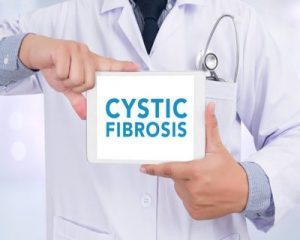- Home
- Editorial
- News
- Practice Guidelines
- Anesthesiology Guidelines
- Cancer Guidelines
- Cardiac Sciences Guidelines
- Critical Care Guidelines
- Dentistry Guidelines
- Dermatology Guidelines
- Diabetes and Endo Guidelines
- Diagnostics Guidelines
- ENT Guidelines
- Featured Practice Guidelines
- Gastroenterology Guidelines
- Geriatrics Guidelines
- Medicine Guidelines
- Nephrology Guidelines
- Neurosciences Guidelines
- Obs and Gynae Guidelines
- Ophthalmology Guidelines
- Orthopaedics Guidelines
- Paediatrics Guidelines
- Psychiatry Guidelines
- Pulmonology Guidelines
- Radiology Guidelines
- Surgery Guidelines
- Urology Guidelines
Three-drug combo effective in cystic fibrosis with most common genetic mutation

DALLAS - UT Southwestern researchers have found that a three-drug combination improved lung function and reduced symptoms in cystic fibrosis (CF) patients who have a single copy of the most common genetic mutation for the disease. The phase three clinical trial has reinforced that the next-generation corrector elexacaftor, in combination with tezacaftor and ivacaftor, can effectively treat patients with Phe508del-minimal function genotypes who did not respond to previous cystic fibrosis transmembrane conductance regulator (CFTR) modulator regimens.
Cystic fibrosis is a chronic, progressive, and frequently fatal genetic disease that affects the respiratory and digestive systems in children and young adults. The sweat glands and the reproductive system are also usually involved. Individuals with CF have a shortened lifespan.
"Although there are over a thousand different disease-causing mutations, nearly 90 per cent of people with cystic fibrosis have at least one copy of the most common mutation, the Phe508del CFTR allele," Dr Raksha Jain, the corresponding author of the study said.
An estimated 80,000 people worldwide are affected by mutations in the cystic fibrosis transmembrane conductance regulator (CFTR) protein, she said. People inherit a gene from each parent that encodes the CFTR protein.
"This three-drug combination was highly effective in people with cystic fibrosis who inherited the Phe508del CFTR mutation, improving health outcomes and symptoms," said Dr. Jain, referring to the NEJM study on those with one mutated copy of the gene.
The Food and Drug Administration approved the therapy based on the results of this international study, published today in the New England Journal of Medicine. A companion investigation appearing simultaneously in The Lancet reported on people with one or two copies of the mutation.
In an accompanying editorial, Francis S. Collins, MD, PhD, director of the NIH, noted that these findings move the medical community one step closer to providing safe, effective and targeted therapies to most patients with cystic fibrosis.
Dr. Raksha Jain, Associate Professor of Internal Medicine at UT Southwestern Medical Center shall present the findings at the North American Cystic Fibrosis Conference in Nashville this week.
In the clinical trial conducted at 115 sites in 13 countries from June 2018 to April 2019, 403 patients of ages 12 and older were randomized to receive either elexacaftor-tezacaftor-ivacaftor combined therapy or a placebo.
Lung function was measured at four and 24 weeks. Compared with patients receiving a placebo, lung function in the treatment group was significantly improved at four weeks and sustained through week 24. In addition, lung flare-ups, or increases in symptoms, were 63 percent lower in the treatment group. Study participants also answered questionnaires regarding their quality of life and respiratory symptoms - with those in the treatment group reported higher scores in these areas.
Excessive amounts of salt via sweating is a hallmark of cystic fibrosis. The treatment group had a lower concentration of salt in their sweat than the placebo group, which demonstrates how this therapy in targeting the underlying cause of the disease, she added.
Adverse events leading to discontinuation occurred in 1 per cent of those getting the drug combination. Although the therapy was generally safe and well-tolerated, long-term studies are needed to further understand potential side effects, Dr Jain said.
"The CF community is working hard to find highly effective therapies for people who are not eligible for this treatment because they don't have the appropriate gene mutation," said Dr Jain, a Dedman Family Scholar in Clinical Care and Director of the UTSW Adult Cystic Fibrosis Center.
For more details click on the link: http://dx.

Disclaimer: This site is primarily intended for healthcare professionals. Any content/information on this website does not replace the advice of medical and/or health professionals and should not be construed as medical/diagnostic advice/endorsement or prescription. Use of this site is subject to our terms of use, privacy policy, advertisement policy. © 2020 Minerva Medical Treatment Pvt Ltd